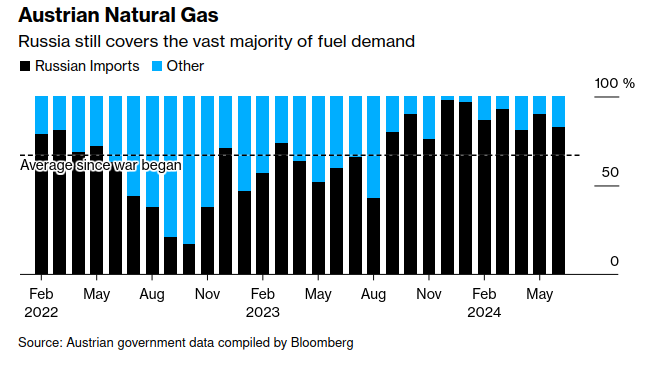Wien Energie GmbH, Vienna's largest energy company serving two million people in the Austrian capital and its surroundings, has announced it will stop using Russian gas from 2025. This decision marks the end of decades-long dependence on Russian fuel and coincides with the expected cessation of gas transit through Ukraine.
"Due to Russia's aggressive war, independence from Russian gas is crucial for supply security. All households, commercial customers, and power plants will run on non-Russian gas in 2025," stated Peter Hanke, Vienna's finance chief.
The company reported securing 10 terawatt-hours of alternative sources, equivalent to about 12% of Austria's national consumption. New supplies will come from North Africa, the North Sea, and other global liquefied natural gas suppliers.
As was reported previously, Ukraine announced it would stop transit of Russian gas to the EU in the end of 2024 as the current agreement expires. The transit end would cost Russia approximately $6 billion export losses, reducing tax revenue available to finance the current war against Ukraine.

Wien Energie plans to use blockchain-based certificates of origin to guarantee that the fuel does not come from Russia. The company has promised not to raise prices for end consumers despite alternative sources potentially costing slightly more.
This decision is significant for Europe's gas market as traders prepare for Russian gas flows via Ukraine to stop in January. In the first half of this year, Austria received over half of its gas supply through this route.
It's worth noting that Austria traditionally had one of the oldest and deepest connections to Russian energy in Europe. In 2018, the country even extended a long-term gas contract until 2040. However, Russian aggression in Ukraine has forced a reconsideration of these relationships.
Wien Energie's decision reflects a pan-European trend towards diversifying energy supply sources and reducing dependence on Russian energy resources. This move by one of Russia's last big EU gas consumers turning off the tap underscores Europe's ongoing efforts to wean itself off Russian energy, a process accelerated by the conflict in Ukraine. At the same time, the EU, in particular Greece, still allows its tankers to transport Russian oil to the world market, widely contributing to Russian financial stability necessary to continue the war.
Related:
- Starmer responds to Putin’s threats: Russia started the war and can end it
- Russian Central Bank raises key rate to 19% as inflation surges
- Voice of America: Russia repairs Su-30s with Western equipment
- Polish FM visits Lviv, urges faster aid to Ukraine
- Fourth Crimea Platform Summit draws over 60 international participants in Kyiv

